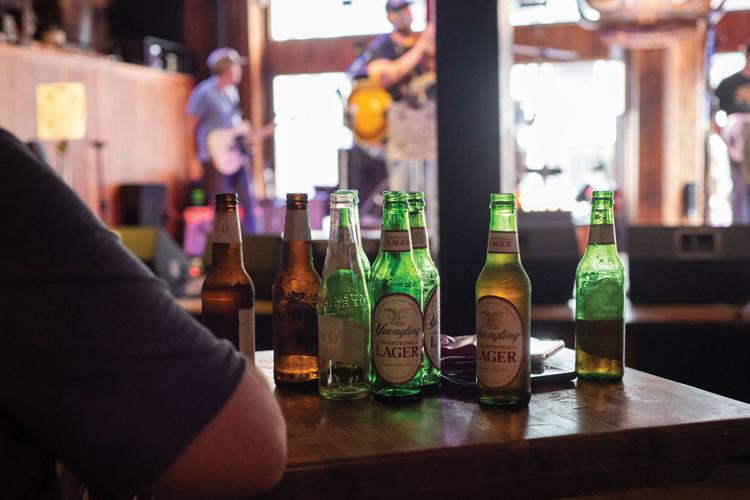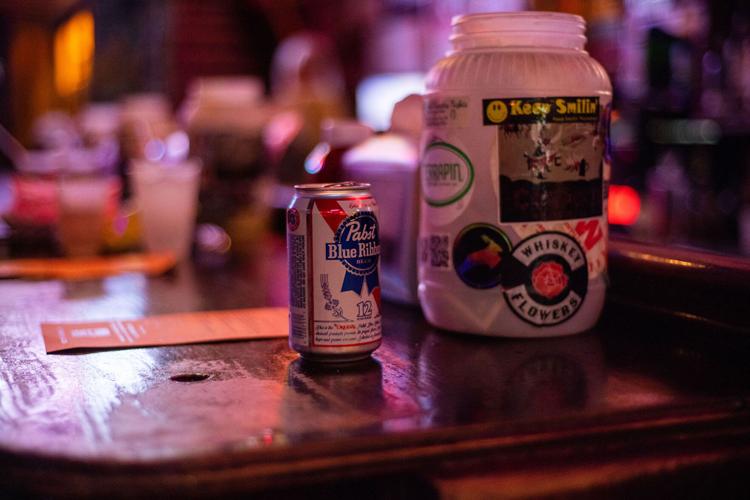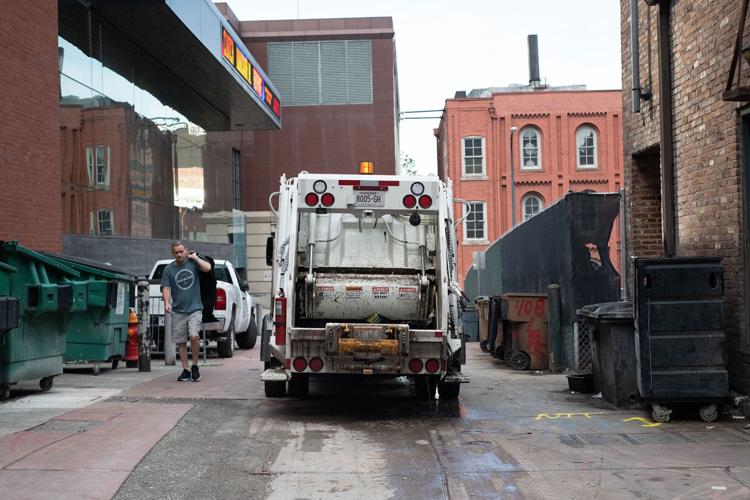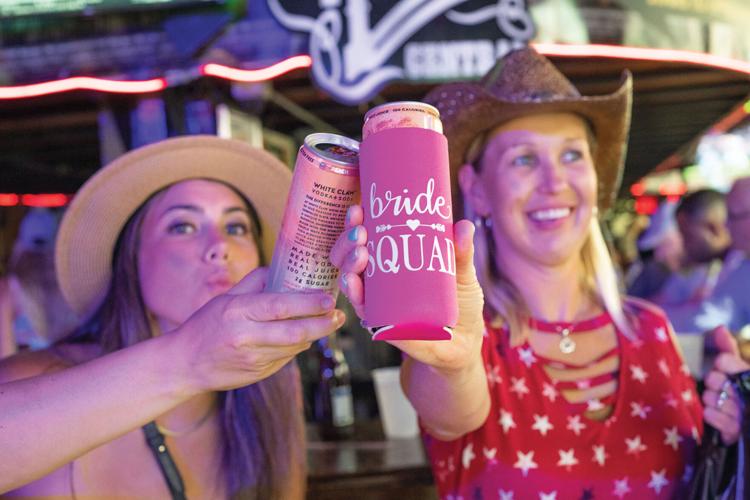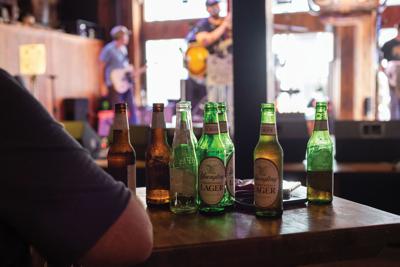Walk down Lower Broadway on a hot summer day, and the streets are bustling. Families with children seeking a taste of Americana. Bachelorette parties wearing neon cowboy hats and sweat-streaked makeup. Black-clad barbacks running to work in sensible shoes. Musicians lugging equipment from one gig to the next. Neon lights turn on at 11 a.m., luring pedestrians toward air-conditioning and cold drinks. The guitars and singers onstage are sometimes only the background music to the satisfying sounds of beer cans opening and bottles being popped at the bar.
These cans and bottles all end up in the huge blue and brown trash bins tucked away every few blocks in alleyways and around corners, and they mostly sit open during the day — each already filled or about to be filled with 8 cubic yards of broken-down cardboard boxes and huge bags lumpy with cylinders.

Nashville has waged war on its waste problem for a decade, with Nashville producing nearly twice as much waste per capita as those in the rest of the country in 2020. In 2022, the Nashville Downtown Partnership removed 602,000 pounds of waste in eight months from downtown trash cans and alleyways alone. While initiatives like Urban Green Lab and the Zero Waste program strive to educate citizens on reducing waste and provide more access to residential recycling, the refuse of the revelry at the bars and honky-tonks of Lower Broadway poses an even more complicated problem that requires large-scale changes in both waste management infrastructure and the way bars use disposables. But there may be a light at the end of the tunnel: As part of the Second Avenue Rebuild project — which launched in the wake of 2020’s Christmas Day bombing — innovative measures are being tested nearby that could set an example for turning Lower Broadway’s “trash” into treasure.
In 2018, former Mayor Megan Barry attempted the Honky Tonk Glass Recycling Pilot program to collect bottles — which ended abruptly due to high costs and low revenue. Currently, most bars on Lower Broadway contract their waste removal to independent companies, with Metro offering cardboard recycling pickup to a few downtown businesses (although that is currently on pause due to vehicle capacity). Metro Waste Services also collects trash off the streets to prevent critters and protect public health.

“Lower Broadway is really about the volume of trash and the ability to sort it effectively,” says Jenn Harman, who has been the manager of Metro Nashville’s Zero Waste program since 2019. “It’s really hard when the restaurant or bar is just trying to get it out of the way so they can keep operating their business.” Metro focuses primarily on residential recycling, which means other than picking up trash for public health purposes, most businesses on Lower Broadway are on their own. Harman also points out the difficulty in sorting glass and metal, not using plastic bags — which can’t be recycled normally and sit in landfills — to hold recyclable materials, and the danger of dumping glass in a bin.
“Everything ended up contaminated, so we were sending out more trucks without being able to collect a huge quantity of good material that could be recycled,” says Harman.
Ashley Boyd has been bartending at Robert’s Western World — where only bottled and canned beer is served — for four years. She says it’s not hard for bartenders to sort bottles behind the bar. When her enterprising 5-year-old nephew asked her to collect bottle caps so he could sell them at a premium to classmates, she didn’t find it inconvenient at all to sort them into a bin rather than throwing them in the trash, even during peak hours.
“I realized that I have the time to do that,” says Boyd. “If trash cans were placed in the same spot, it would be easy.”
Recycling on the other side of the bar, however, poses more of a dilemma — separate bins would mean two to three times the work for the barbacks who are hauling heavy trash bags up and down stairs, and it would be difficult to get customers who’ve been drinking to properly dispose of their containers. Bartenders and barbacks the Scene chatted with on Lower Broadway echoed Boyd’s sentiments. On a calm Monday afternoon with only a few tourists and locals sipping on Coors bottles, it’s easy to imagine neat stacks of clean cans and bottles ready to be recycled. But that’s a different scenario from Broadway after 7 p.m., or just about any time on a weekend — patrons are more concerned with dodging vomit and elbows than with where a can goes.
Strolling farther down Broadway to Second Avenue, renderings of coming construction drape walls chewed ragged by the 2020 bombing, and old walls sport new barbed-wire trim to protect the rebuilding inside. On the three-block stretch of Second Avenue between Broadway and Union Street, Metro and the Metro Development and Housing Agency are partnering with sustainability consulting company Wilmot Inc. and The District, a nonprofit dedicated to revitalizing Nashville’s downtown historic areas, for a futuristic form of infrastructure. A pilot project, which began in 2021, will harness new energy-saving techniques and consolidate waste collection. Wilmot Inc.’s Tiffany Wilmot tells the Scene her company has conducted studies on how recycled glass could be repurposed, including as a form of gravel beneath parking lots and sidewalks. If the pilot project is successful, Wilmot hopes the city could expand it beyond Second Avenue.
When Wilmot looks at the trash downtown, she doesn’t see waste going in the bin — she sees “excess materials that are basically profit being thrown away.” The innovative ways Wilmot hopes to sort recyclable materials and use glass could potentially be used to transform recycling on Lower Broadway. By consolidating the stream of material to a single contractor that moves down Ryman Alley (which joins with some parts of Lower Broadway), removing food waste and instituting separate recycling bins in consolidated areas that businesses can share, they reduce the risk of glass ending up on the street or not being properly sorted. Wilmot tells the Scene that the glass could potentially be crushed into gravel and used for construction locally, rather than being shipped out to Atlanta landfills.

Wilmot is also recommending ways bars can reduce the amount of materials being used, such as implementing reusable containers.
“A lot of the honky-tonks are really interested in this because it’ll save them money,” says Wilmot. “And it gives somebody a job, right? You put a dishwasher in, and then you have a human being who has a job instead of a material that gets thrown away.”
Wilmot’s Second Avenue project manager Mark Pruett reminds us that the city wasn’t built with modern waste disposal in mind. He tells the Scene that waste removal could be optimized.
“It’s about finding systems to augment what’s already there and taking all these materials and making use of them again,” says Pruett.
While the Second Avenue project is still mostly dealing with hypotheticals, if it is successful, it could lay the road map for a greener Lower Broadway where glass bottles are properly sorted, honky-tonks use reusable cups, and your beer can is recycled. The Zero Waste Program has a deadline of 2050 to figure it out.

